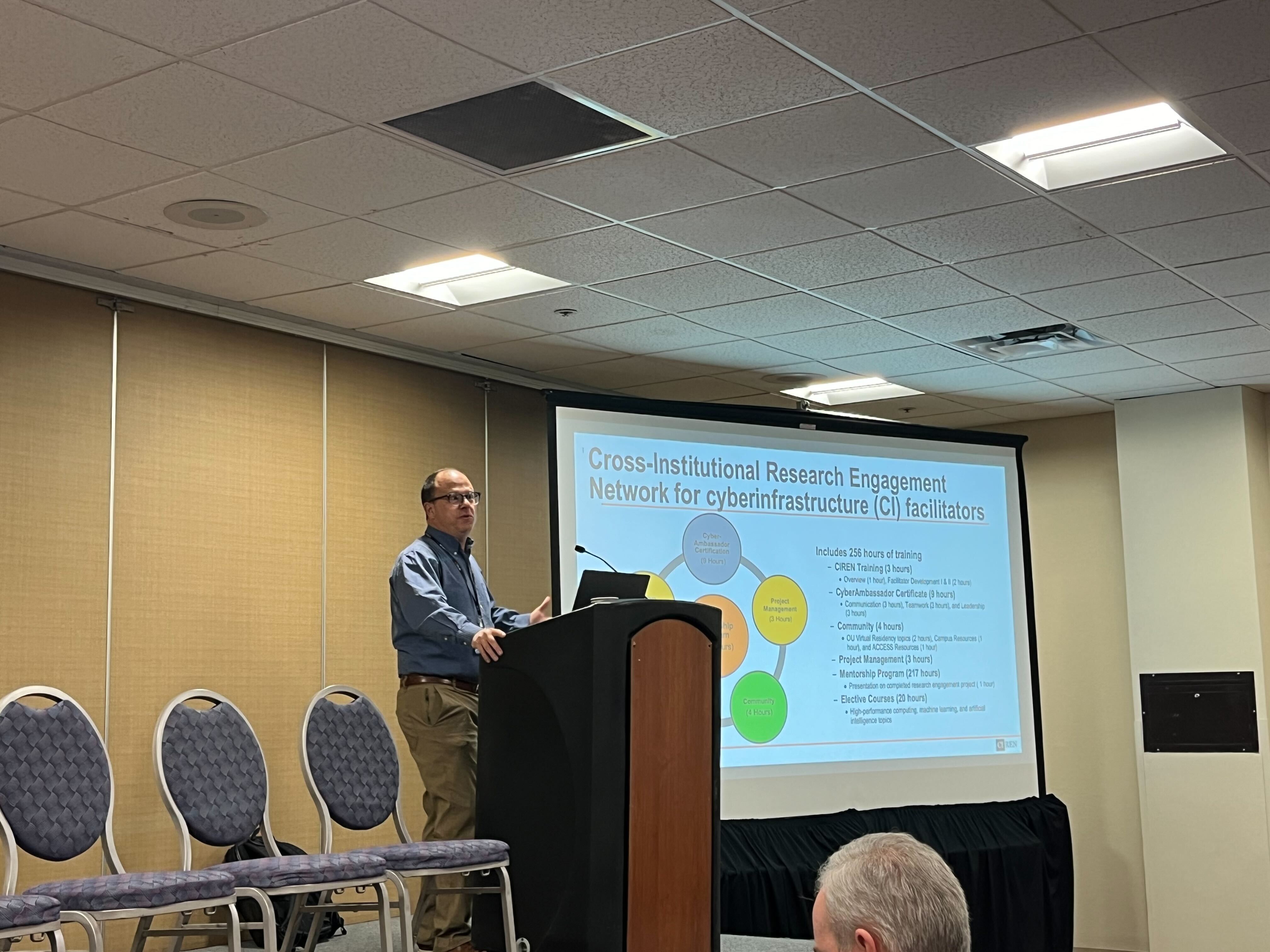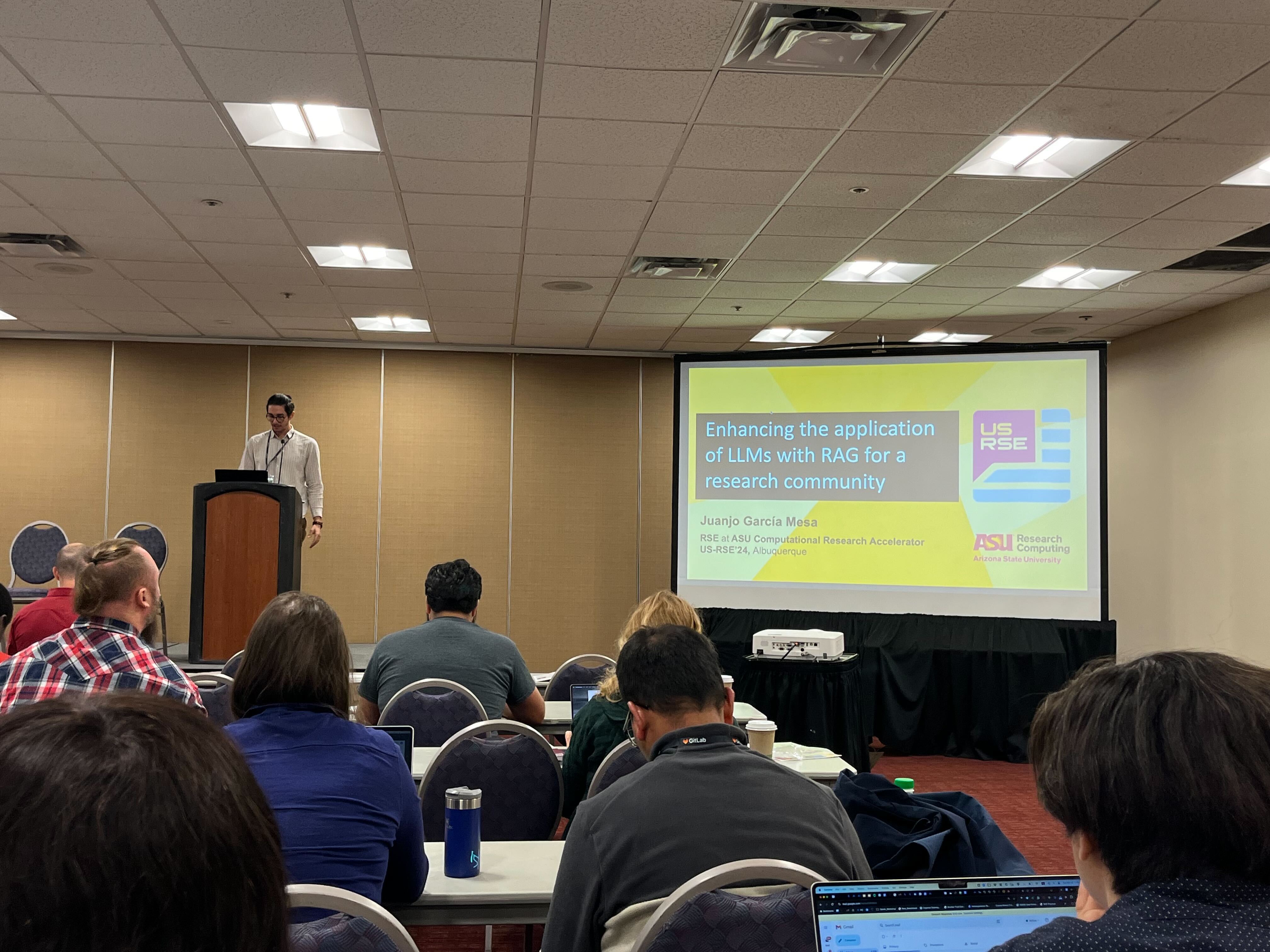ASU at US-RSE’24
by Julia Damerow on October 24, 2024
The second annual conference of the US Research Software Engineer Association (US-RSE’24) took place in Albuquerque, New Mexico from October 15 to 17. Multiple research software engineers (RSEs) from ASU took this chance to connect with other RSEs from all over the country — to learn, discuss, and present.
 The conference was kicked off by Simon Hettrick, Director of Strategy at the Software Sustainability Institute and a Director of the Southampton Research Software Group, with his talk titled “Research Software Engineers: where it started and where it’s going.” Simon talked about the importance of research software engineers and what a bleak future it would be if they did not exist. On day two, Sandra Gesing, Executive Director of the US Research Software Engineer Association (US-RSE), gave her keynote on the role of RSEs in the US and how US-RSE supports and advocates for the community.
The conference was kicked off by Simon Hettrick, Director of Strategy at the Software Sustainability Institute and a Director of the Southampton Research Software Group, with his talk titled “Research Software Engineers: where it started and where it’s going.” Simon talked about the importance of research software engineers and what a bleak future it would be if they did not exist. On day two, Sandra Gesing, Executive Director of the US Research Software Engineer Association (US-RSE), gave her keynote on the role of RSEs in the US and how US-RSE supports and advocates for the community.
Our ASU-RSE community contributed to the conference by co-organizing two Birds of a Feather (BoF) sessions. Julia Damerow (School of Complex Adaptive Systems) and Jason Yalim (Research Computing) organized a session together with Jeffrey Carver (University of Alabama) titled “Teaching Research Software Engineering” that discussed different approaches of teaching best practices and technologies for research software engineering. Julia Damerow also organized a BoF on “RSEs in domain-specific ecosystems” together with Rebecca Sutton Koeser, Laure Thompson and Jeri E. Wierenga (all from Princeton University), in which the attendees discussed how the role and competencies of RSEs differ depending on the domain they are working in. Additionally, Julia was on a panel for the BoF “Navigating the Remote Landscape: Working Effectively with Stakeholders,” which was organized by Troy Comi (Princeton University) and that discussed strategies for RSEs to work and collaborate with researchers and teams working remotely.
Susan Massey (Research Technology Office) presented a poster titled “The value of RSEs for smaller-scale research needs: a vignette” that showcased her work with the TCGA datasets as part of her role as a cyberinfrastructure facilitator in the Cross-Institutional Research Engagement Network (CIREN). Juanjo García Mesa and Gil Speyer (both Research Technology Office) presented their paper “Enhancing the application of large language models with retrieval-augmented generation for a research community” that talked about their work exploring the implementation of retrieval-augmented generation (RAG) to enhance the contextual accuracy and applicability of large language models to meet the diverse needs of researchers. Nicole Brewer (doctoral student in history and philosophy of science) co-presented a talk titled “Reproducing notebooks without (too much) effort: a simple but effective automated workflow for US-RSE’24 and beyond using Binder and GitHub Actions.” Victoria Uribe (doctoral student in applied mathematics) was sponsored by the student program offered at US-RSE’24, which included being paired up with a mentor, an ice cream social, and a visit to the University of New Mexico’s Center for Advanced Research Computing.
ASU’s Research Technology Office and School of Complex Adaptive Systems showed their support for RSEs at ASU and the profession as a whole by being a silver sponsor of the conference, aligning their support with institutions like the Sloan Foundation, Princeton University, Sandia National Laboratories, and GitLab. Additionally, ASU sent eight of their employees to US-RSE’24, and allowed them to spend some of their time volunteering for the conference and US-RSE in general. In summary, we can say wholeheartedly that this year’s conference was another resounding success, and we can’t wait to see what US-RSE’25 brings!
Photo credits: Susan Massey, Victoria Uribe, Julia Damerow
 ASU-RSE
ASU-RSE





